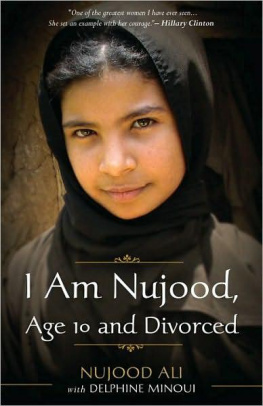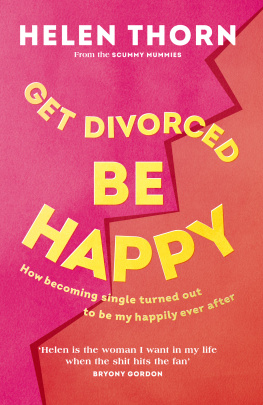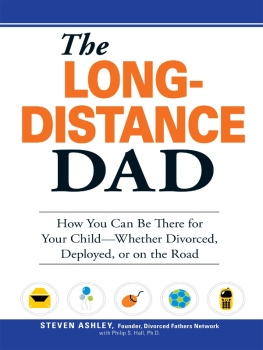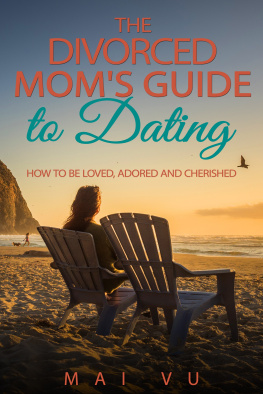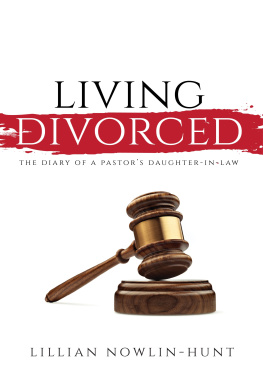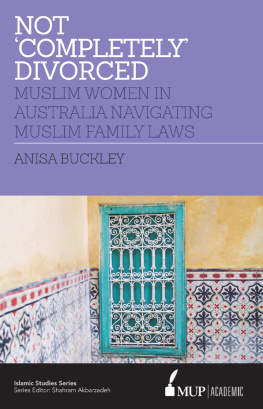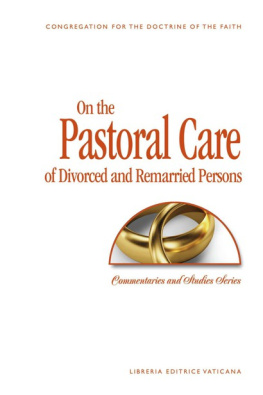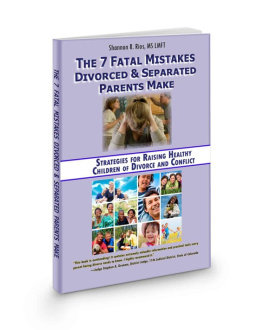Nujood Ali - I Am Nujood, Age 10 and Divorced
Here you can read online Nujood Ali - I Am Nujood, Age 10 and Divorced full text of the book (entire story) in english for free. Download pdf and epub, get meaning, cover and reviews about this ebook. year: 2010, publisher: Three Rivers Press, genre: Detective and thriller. Description of the work, (preface) as well as reviews are available. Best literature library LitArk.com created for fans of good reading and offers a wide selection of genres:
Romance novel
Science fiction
Adventure
Detective
Science
History
Home and family
Prose
Art
Politics
Computer
Non-fiction
Religion
Business
Children
Humor
Choose a favorite category and find really read worthwhile books. Enjoy immersion in the world of imagination, feel the emotions of the characters or learn something new for yourself, make an fascinating discovery.
- Book:I Am Nujood, Age 10 and Divorced
- Author:
- Publisher:Three Rivers Press
- Genre:
- Year:2010
- Rating:4 / 5
- Favourites:Add to favourites
- Your mark:
- 80
- 1
- 2
- 3
- 4
- 5
I Am Nujood, Age 10 and Divorced: summary, description and annotation
We offer to read an annotation, description, summary or preface (depends on what the author of the book "I Am Nujood, Age 10 and Divorced" wrote himself). If you haven't found the necessary information about the book — write in the comments, we will try to find it.
I Am Nujood, Age 10 and Divorced — read online for free the complete book (whole text) full work
Below is the text of the book, divided by pages. System saving the place of the last page read, allows you to conveniently read the book "I Am Nujood, Age 10 and Divorced" online for free, without having to search again every time where you left off. Put a bookmark, and you can go to the page where you finished reading at any time.
Font size:
Interval:
Bookmark:

We would like to thank warmly all those men and women who opened their doors to us, allowing us to tell Nujood's story so that she can be an example to other girls and encourage them to demand their rights.
We would particularly like to thank Shada Nasser, Nujood's lawyer, as well as the judges of the court in Sana'a: Judge Mohammad al-Ghazi, Judge Abdo, and Judge Abdel Wahed.
A big thank-you to the entire staff of the Yemen Times, and especially to their editor in chief, Nadia Abdulaziz al-Saqqaf, and to their former reporter, Hamed Thabet, who is currently serving as the political advisor to the German Embassy in Sana'a.
We are infinitely grateful to Husnia al-Kadri, director of women's affairs at the University of Sana'a, who helped us with her research into the question of early marriage in Yemen.
Our conversations with the personnel of Oxfam, and with Wameedh Shakir and Souha Bashren in particular, were also of great assistance to us.
Thanks are owed to Njala Matri, the principal of the local school in the Sana'a neighborhood of Rawdha, who allowed Nujood to return to the classroom and continue her studies.
We would like to express our profound gratitude to Eman Mashour, without whom this book would never have been published. Her support for the cause of women's rights in Yemen, her patience, and her talents as a translator were of considerable help to us.
From the bottom of our hearts, we thank Borzou Daragahi for his moral support and his enthusiasm for the writing of this book.
Hyam Yared, Martine Minoui, and Chloe Radiguet kindly agreed to be the first readers of these pages. Thank you for your help!
And finally, we are infinitely indebted to Ellen Knickmeyer, who brought us together in the first place.
This book is dedicated to Arwa, Rym, and all the little Yemeni girls who dream of freedom.
D ELPHINE M INOUI AND N UJOOD A LI

1. Honor is obviously very important to the men of Nu-jood's family. What does the notion of honor mean in rural Yemeni culture, and how does it differ from Western ideas of honor? When Nujood, Shada, and their allies go to court to seek a divorce for Nujood, what conception of honor are they defending?
2. Nujood mentions a tribal proverb that says "To guarantee a happy marriage, marry a nine-year-old girl." How does this traditional view of a "happy marriage" differ from the Western view? Are there any ways in which they might be similar?
3. Nujood says that when her family was driven from Khardji, they lost "a small corner of paradise." How do the injustices endured by Nujood's father and brother, Fares, show that life in a patriarchal society can be hard not just for women, but for male Yemenis, too?
Consider how the actions of Omma, Mona, Nujood's mother-in-law, Dowla, and Shada reflect differences in their life experiences, personalities, backgrounds, and relationships with Nujood. For example:
4. What do you think Omma was thinking when Nujood told her about the abuse? Can you understand her lack of action?
5. Conversely, why was Dowla willing and able to give Nujood the help and advice that no one else was willing to provide?
6. Were you surprised when one of Nujood's primary oppressors turned out to be a woman? Nujood's mother-in-law is a strong personality who treats the young girl harshly and fails to come to her defense on her wedding night. How does this play, paradoxically, into the idea of Yemen as a highly patriarchal society? Do you see any similarity, for example, between the mother-in-law's behavior and the fact that in some African societies, it is the women who enforce the practice of female circumcision?
7. How do you interpret the behavior of Mona, not only in her attempts to protect Nujood, but in her difficult relationship with her older sister, Jamila?
8. What enables Shada to take up Nujood's cause so quickly and effectively? How does Shada, whom Nujood calls her "second mother," open up Nujood's world? Who else teaches Nujood about what a "real" family can be like?
9. The urban elites Nujood encounters in the courtroom and at the Yemen Times lead very different lives from those of Nujood and the country people of Yemen. How are these "enlightened" people actually disconnected from the rest of their society? For example, Nujood tells us several times that child marriage is common in Yemen, so why did the judges seem so shocked by Nujood's tender age? Do you think they were unaware of their society's problem with early marriage, or were they simply blind to the real-life consequences for girls like Nujood? Was there something special about Nujood that prompted the judges to help her, or was she simply the first girl who had come to them asking for a divorce?
10. Shada and Nujood chose the less "elitist" option for Nujood's schooling. Do you think Nujood made the right decision--to stay in Yemen for her education? Do you think she will become a lawyer and help other girls like herself, as she says she hopes to do? Closer to home, Nu-jood talks about her protective feelings toward her sisters Mona and Haifa, and even toward her big brother Fares. Do you think Nujood will be able to protect her siblings? What might stand in her way?
11. How has the international publicity surrounding the divorce affected Nujood's family and community? Has it enlightened her relatives and neighbors? Or do you think it may have caused dissension within the family and alienated them from their own society?
12. Khat plays a small but sinister role in Nujood's story. Khat is illegal in the United States, but some people in immigrant communities compare it to coffee and support its important traditional role in social situations. U.S. authorities counter that it is more like cocaine than coffee. After reading this book, what effect do you think khat has on its users and on Yemen in general? Do you feel that it contributed to Nujood's father's problems? If so, how? How do you think its use and effects might compare to social drugs in the United States? And most important, what does it tell us about any society that devotes so much of its valuable resources to tuning out from itself, so to speak?

The Girls World Communication Center (GWCC), a nongovernmental organization based in Sana'a, recently launched a new program called ENTELAK. This program helps girls who have been forced to leave school and those who are young victims of early marriage to continue their educations.
Local GWCC members assist the girls in their studies, helping them to secure a good future. They also lead campaigns to raise awareness among the girls' families and communities about the importance of educating women.
Founded in 1998, GWCC was the first language center in Yemen catering exclusively to girls. Its programs have since expanded to include skills and leadership training, scholarships, and networking opportunities. Supporters include the British Council, the United Nations Development Fund for Women (UNIFEM), and the Glamour Women of the Year Fund. If you wish to make a donation, you can access the website at http://www.yldf.org/ or contact
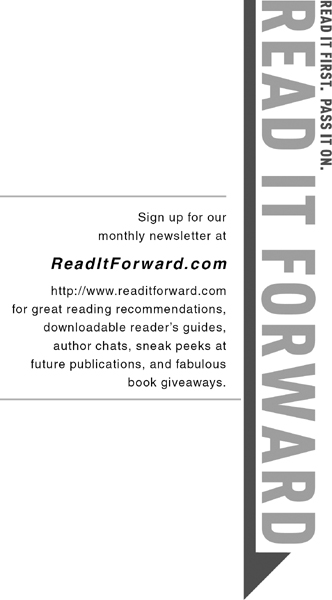
Font size:
Interval:
Bookmark:
Similar books «I Am Nujood, Age 10 and Divorced»
Look at similar books to I Am Nujood, Age 10 and Divorced. We have selected literature similar in name and meaning in the hope of providing readers with more options to find new, interesting, not yet read works.
Discussion, reviews of the book I Am Nujood, Age 10 and Divorced and just readers' own opinions. Leave your comments, write what you think about the work, its meaning or the main characters. Specify what exactly you liked and what you didn't like, and why you think so.

